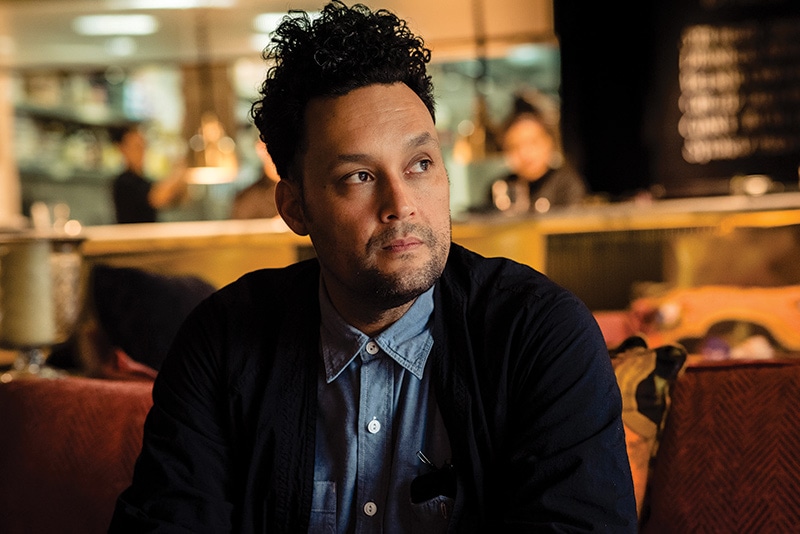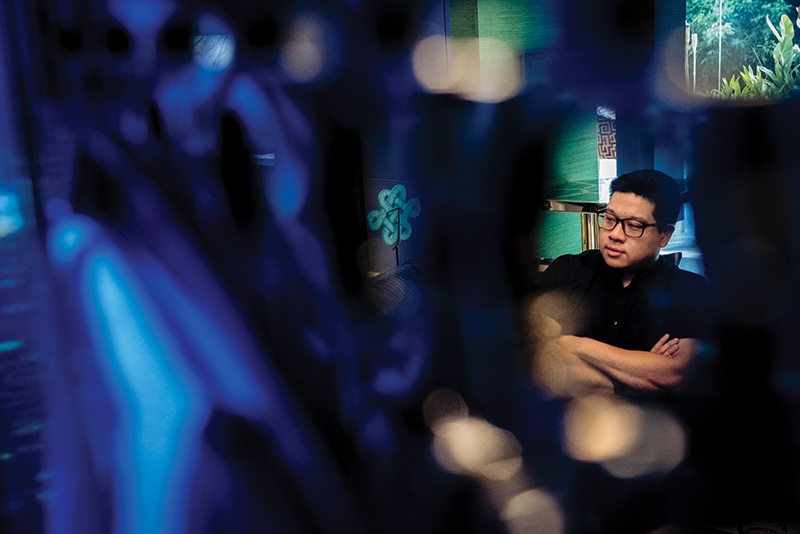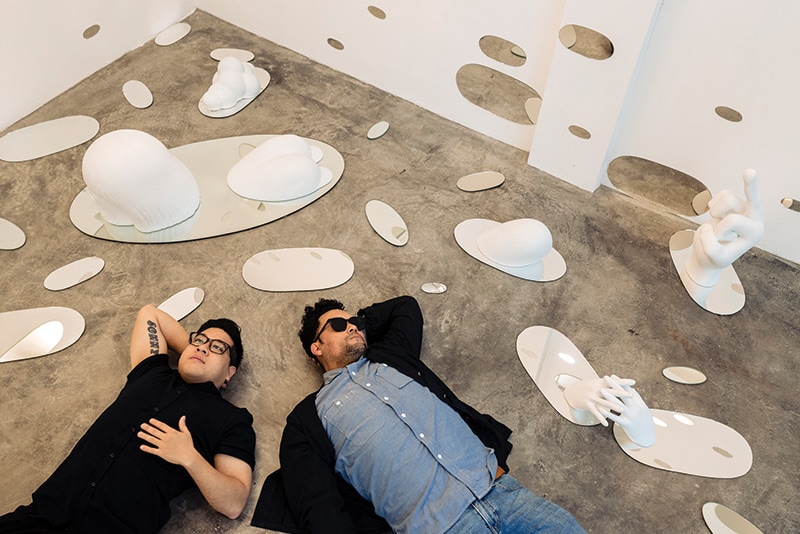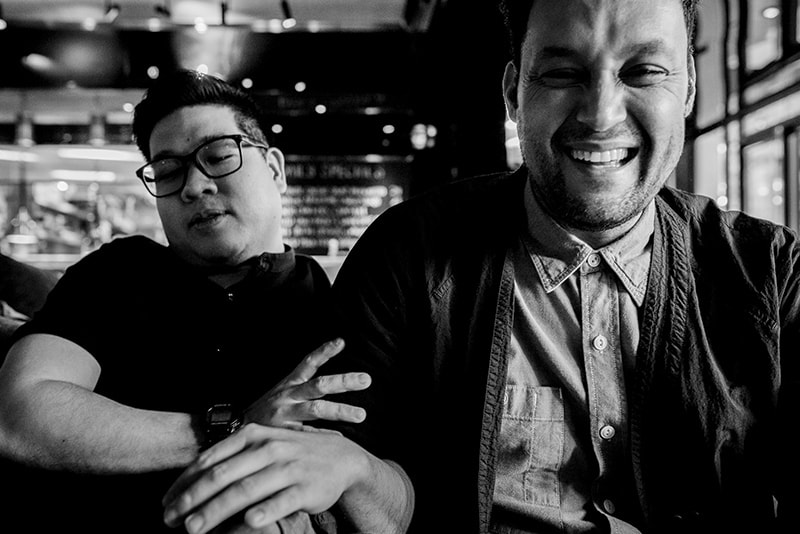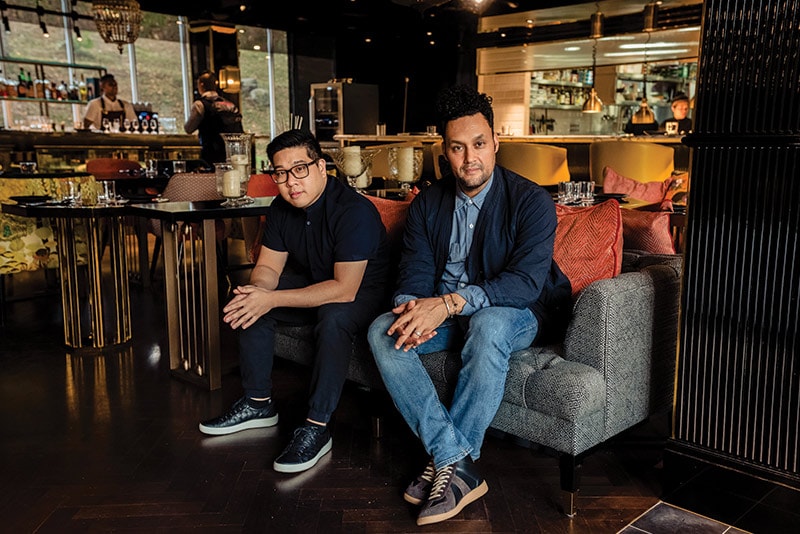We Asked Javier Perez and Ming Tan to Interview Each Other. It Got Deep.
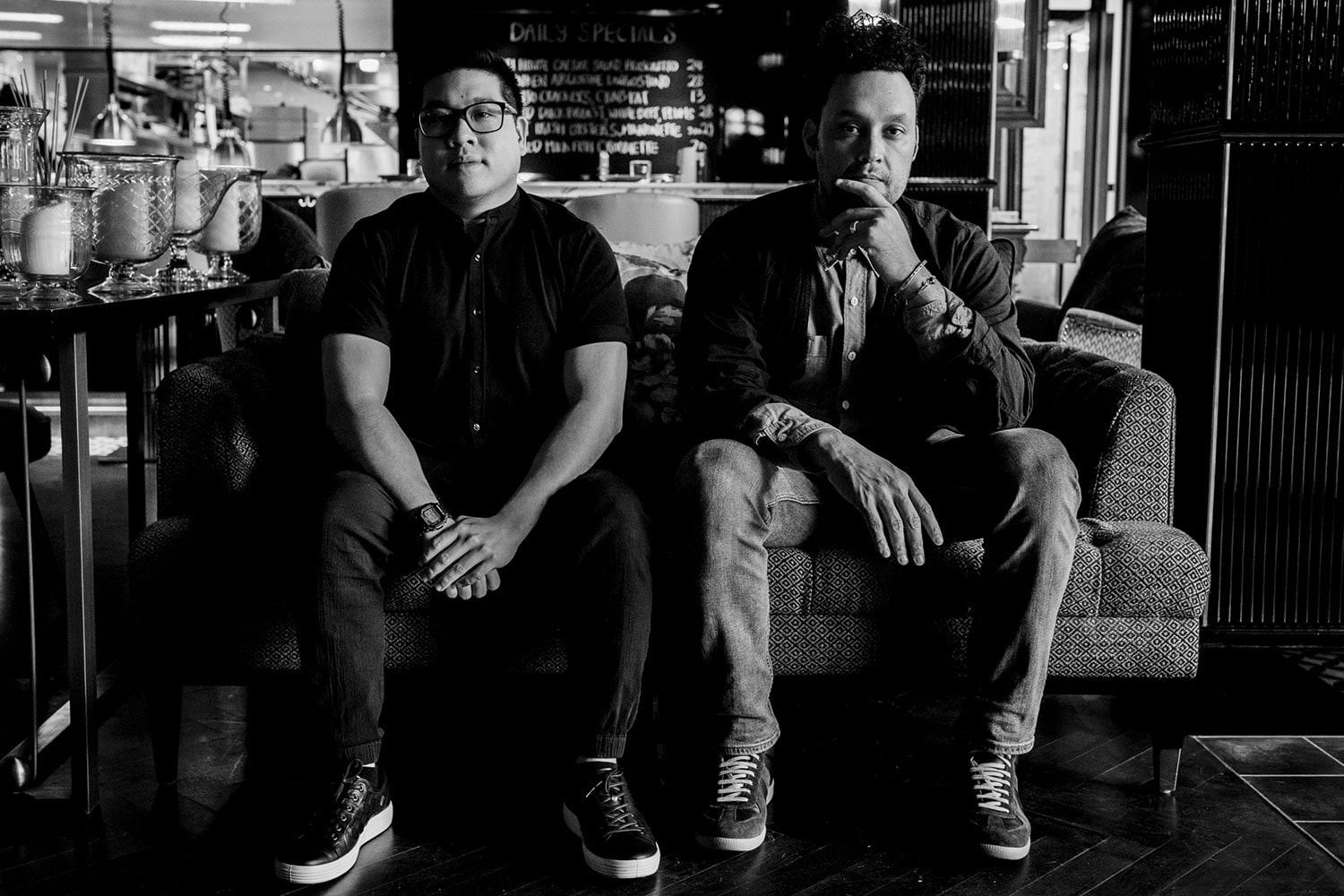
It’s a sleepy afternoon in Dempsey Hill. The lunch crowd has dissipated, leaving in its wake a languidness that hangs in the humid air. There’s practically no one at Siri House, a multi-concept joint by Thai property developer Sansiri that houses a restaurant, art gallery and showroom. At 3pm, the doors swing open and suddenly, the place lights up. Javier Perez saunters in, gesturing a congenial greeting towards us while in the middle of a phone call. Despite the obvious fatigue of welcoming a second child and returning from a business trip in China not too long ago, he commands the room with his towering stature, and exudes an immediate sense of warmth and brio. While waiting for chef Ming Tan, he catches us up on his latest hospitality project, on top of his multiple existing ventures as the founder of casual dining restaurant Grain Traders and Kilo, a cultural hotspot that blends food and entertainment. Halfway through, Ming emerges out of his preparations for the evening rush at Jam at Siri House, and joins us at the establishment’s quirky, eclectic showroom. Taking a break from running the kitchen, the executive chef (formerly of Lolla and Park Bench Deli) dives straight into the interview and takes charge of the conversation, occasionally gushing about his admiration for the F&B veteran beside him. A two-hour-long heart-to-heart unfolds between Ming, the indefatigable culinary maestro with an eloquent tongue, and Javier, the charismatic yet contemplative trendsetter with a spiritual heart. Unafraid of vulnerability, the duo confess feelings of inadequacy amidst external success, exchange philosophies of how to create indelible experiences through food, and divulge trade secrets like age-old friends.
MING TAN: You’ve been hanging out in China for a fair bit, right? I spent a bit of time in China last year as well, and I have to say the rest of the world is f**ked because the Chinese are progressing at a pace that is leaving everyone else behind.
JAVIER PEREZ: What I’m really impressed with is the people, how intellectually switched on they are. I love the fact that in my first three or four trips to Beijing, I didn’t hear any expats speak English. The fact that people are adapting to them, and not the other way around, is really cool.
MING: What are you up to in China?
JAVIER: I’m building a hotel in KL. My partner, who owns the building in KL, has a property in China. We’re just exploring opportunities. I’m doing a lot of research and getting to know what the current business is, what other people are doing, how the market is responding. I don’t speak about it too much. It’s not something that’s going to happen right away.
MING: People look at you as not just an F&B guy. They look at you as a guy who has a depth of knowledge in various things. A lot of your business and operational experience comes from creating spaces that involve music, food, entertainment and events. In order to get good at all these things, you need to be thirsty for knowledge and be able to talk to anyone and figure out what makes them tick. That’s how I would characterise you, as understanding intrinsically what kind of things people like, what kind of experiences they’d want to have in groups and social settings. If you had to put together a list of your milestones in the last 14 years since coming to Singapore at 26, what are a couple of key points that have brought you to where you are now today?
JAVIER: I think the biggest milestone was opening Raw Kitchen Bar. I was 29 then. Maybe none of you know about Raw Kitchen Bar, but amazing people who have shaped the social scene in SG used to be a part of that. We used to throw these parties there. We’re just having fun. That was where I met so many great people. That was the genesis of what Kilo became. The second one is taking over that building in Kallang.
MING: Iconic, man. You did so many weird things there.
JAVIER: It doesn’t look so good now. It’s run down. If you looked at it eight years ago when we first launched it, it was so dope. I have this great picture of me at 30 years old, talking to seven Chinese guys, all contractors. When I look at that picture, I remember the times when I felt like I had no clue what I was doing. I have an aunt who would always say, “If you don’t know something, just make it up.”
MING: Fake it till you make it.
JAVIER: Yeah, kind of like that, but with genuineness. Don’t lie and deceive people. I think it was Theodore Roosevelt who said, if you’re ever asked whether you can do something, always say yes. If you don’t know how to do it, figure it out later. I’ve always believed in that.
MING: [laughs] It’s great hearing this. I never knew that. At 26, I was hired as head chef of Lolla. I had no f**king clue what I was doing because I had no prior professional kitchen experience. I came from a private dining background, where I went to people’s houses, used their equipment and cooked for them. It’s very solo work. There’s not really the pressure of running a service and training a team.
JAVIER: I didn’t even know you were that young. I feel like over the last three years, you’ve done a lot and pivoted a lot, whether it’s with different restaurants or people. Where are you now? Do you feel like you will transition again soon?
MING: I definitely have, in Chinese we say, a pointed backside. There’s no way I can sit still, but I’ve built a team here for that purpose. Everyone thinks I’m the chef. I’m actually just the executive guy. To give you a bit of backstory, Sansiri is Thailand’s largest property developer. Their reputation is stellar. They’re market leaders, a massive company worth US$2.5 billion, and they’re just nice people in general. They literally cold-called and said, “Are you Ming? Can we open a restaurant with you?” I was like, “What the f**k? What do you mean?”
Now this is a real passion of mine. What happens when cities grow too expensive for the young? They grow outside and as they move, the fringe areas get gentrified. They get folded into the expanding core, and the cities grow again. Each time a city grows, there’ll be non-mature spaces. No one wants to live there because there isn’t a community with restaurants to eat at, or markets to go to. This is happening all over China. That’s why you have things like co-working spaces, mixing F&B, entertainment and residential properties in the same space.
Unbeknownst to me, Sansiri was doing that. They said, “We don’t want to be seen as guys who just build condominiums. We want to be people who build cities.” I was very taken by that. The only reason why I started this was because I had partners. To answer your question, what the last couple of years has given me is an intrinsic understanding that no man is an island. I could have the best idea in the world and the strongest will to execute it, but if I don’t do it with the right people, nothing is going to be done or it’ll be done in a half-assed manner. Sometimes entrepreneurs think they have to get their hands dirty and do everything, but if everyone’s scrubbing the deck, who’s standing at the helm going, “Alright, the weather patterns are changing. We’re going this way instead.”
JAVIER: But that’s also part of the process. You may have to experience that shit for a certain amount of time. Not to counter it, but movement allows you to see things through. That’s why I’ve never taken a consultancy job or done anything short-term. I believe great things take time. I started working on Grain Traders in October 2012. We didn’t open our doors until September 2015. Even now, it’s not completely where I envision it to be. Ambition is both great and dangerous. It’s a double-edged sword. Sometimes we may be blinded by it.
MING: Has that happened before?
JAVIER: Not to me yet. People say I’m a very daring, ballsy person, and even though I am, there are times when I still see a very conservative and cautious man in the mirror.
MING: Risk-averse? Really?
JAVIER: Yeah. My mother always used to tell me, from when I was 14 years old, before I left the house, “Think twice, act once.” She didn’t want me getting into trouble on the streets.
MING: Were you always getting into trouble on the streets?
JAVIER: No lah. But that stuck with me and bled into my professional life. I’m also a big believer in honing into your own energy and trusting your intuition. Still, sometimes you have to go through bad misunderstandings. I know I have things to offer and I try to be Love, but I also have a boatload of insecurities. I’m really easy to talk to, but when I’m in a group, the inner me is hyperventilating. I hate going to restaurant openings. Everyone’s going to come up to you and congratulate you. I’d rather you write me on WhatsApp. But it’s weird because sometimes I have this narcissistic personality. I want the attention but I don’t want it. [laughs] What were you like as a kid?
MING: I was underweight and didn’t enjoy food that much. I was always reading. I liked musicals. You’re a very musical person too, right?
JAVIER: There were three things that I wanted to be when I was growing up. I wanted to be a baker, a baseball player, and write Broadway musicals. Even now, when I read my daughter books, I never read her books. I’m just making up a story or singing a story.
MING: [laughs] Anyway, to answer your question on whether I’ll transition again, I’m quite settled with this team here. It’s almost entirely Singaporean. I hand-picked them from the various businesses I’ve been involved in. I trained my sous chef from an intern when she was at Temasek Polytechnic. I first met her in my second year at Lolla. She was looking for a last-minute internship. I thought, “This one slipped through the cracks.” She turned out to be f**king amazing. On slow nights, as an 18-year-old, I’d let her control the flow of the kitchen.
JAVIER: How old is she now?
MING: She’s 25. This is a lesson that I’ve just begun to learn, and am going to keep learning until I’m an old man. If your team feels comfortable, happy, and settled, and work is a pillar of stability for them, what they put out is going to reflect that. They’ll want to do better. It’s quite a simple concept, but it’s hard to execute, especially in F&B where they use people and squeeze them dry before they move on to the next company.
JAVIER: I think you have to, first and foremost, give people something to be proud of. That’s what the greatest companies do. You feel pride in having a business card with your name on it.
MING: A small part of ownership.
JAVIER: Of belonging... So what type of food are you doing here?
MING: Everyone thinks we’re a Thai restaurant. We’re not. We do cocktails and comfort food. We do a lot of technical things in the kitchen, but everything that comes out is very unadorned and simple. A lot of our ideas come from the family meals we’ve cooked. We’ve only been open for about 10 weeks, but we’ve already had 23 book-outs. We tell them, “Since you’re booking the place out, we’re going to put out a whole buffet line, and every single dish will be customised to what you guys want.”
Last week, we had a proposal. This girl thought she was bringing her boyfriend here to surprise him with a birthday meal. He ended up getting her entire family to hide in this room, and surprise her with a proposal. He made us concoct a menu that had all her favourite food. We had a bak chor mee station, strange desserts, roast chicken, but it made sense to everyone there.
She was crying outside because he proposed. She stepped in, saw the buffet, and burst into tears again. This is exactly what we’re trying to do. It’s comforting to people. I’m not going to be pushing for accolades or strange foods here. I’m going to be pushing for laughter, smiles and conversations. The food and drinks almost become slightly secondary. And that’s okay. It means it’s done its job.
JAVIER: I was talking to a friend of mine the other day. I knew I wanted to have a restaurant when I was about 12 or 13. The first person that I mentioned it to, and I remember the day and place, was my grandmother in Puerto Rico. I wanted to have my restaurant because my uncle had two friends who owned a restaurant in Puerto Rico.
Every time I went to the restaurant, it was incredible. These guys were magicians. They would stand at the door, and say hi to everyone. They didn’t cook. They were just the best hosts. Every time I went there, I literally would never eat. I’d be watching them. When I told my grandmother, she got a pen from a waiter in that restaurant, took an envelope and started writing on it.
MING: What did she write?
JAVIER: She wrote a list of things to do if I wanted to own a restaurant. My grandmother’s never had a restaurant in her life and the first thing she wrote was, “You need to look at how you treat people and how you make them feel.” The third point was on food. I lost that envelope in my early 20s when I moved to New York, but I carried it with me for over a decade. If I only had that thing now, it would be framed in my office. It’s not that I know what people want, but I want to see how I can make people feel. In all our concepts, the food has always been secondary. That’s why Kilo was never a chef-driven restaurant.
Going back to the food though, one of the perceptions I’ve always had of you is that you wanted to shock people with things you did. I also associated you with “dude” food. Everything was very decadent and heavy. Very different from Lolla. Now you’re looking at comfort food. What’s your food philosophy now?
MING: It’s still about eating in groups. Food and drinks are better shared. There are times when you want to sit back, have a cigar and enjoy your own glass of whiskey, but when I think back to all the best food memories I’ve ever had, it’s always been with human interaction. They were not meals where I was personally brought through an adventure or discovery at fine dining places. Those were good and intellectually eye-opening, but the best meal I had was, let’s say, the first time I had oysters with my brother. We travelled really young. My parents valued the education of travel and just eating things and not being shy.
I grew up in Taipei and went to an American school there. Right next to the school was an American club. There was this dish I would always order. It was prawn fried rice. It wasn’t a special dish or anything. It was just cooked with such brilliant consistency. I had locked away the flavour in my mind, and I knew that if I’d ordered the same thing again, it would be that same flavour. They must’ve had just one guy or a team of robots cooking the same thing over and over again.
JAVIER: You never know anymore. One of the best Italian restaurants that I used to go to in my early 20s in New York was called Nino’s Pizzeria. This restaurant was so good. The pastas, the lasagne… Over time, I became a regular and I got to know Nino. One day, I said to him, “Hey man, can I meet your chefs?” He takes me back to the kitchen. There were five guys back there. Guess where they were from.
MING: Latin America?
JAVIER: They were all from Argentina. [laughs] I was like, “What? What is going on here? How did you guys produce this bomb-ass food?” It was so funny to me. I thought I was going to see some Italian dude. The first restaurant I had was a Vietnamese restaurant. I didn’t know shit about cooking. I’m not a chef. Every dish that I did in that Vietnamese restaurant came out of a book. The only thing that didn’t come out of a book was the banh mi.
Fast forward to Raw Kitchen Bar, not a lot of people know this, but a good number of the recipes came from Donna Hay books. I took a lot of inspiration from her cookbooks and online recipes. Everybody thinks I’m a foodie, but I’m not.
MING: Why do you think the F&B industry is so alluring?
JAVIER: Restaurants are epicentres. They’re nucleuses within themselves. They have energy and vibrancy, but we only see the glamorous parts of it. I’ve had partners in the past who’ve come and gone because they didn’t know there was this much work or we needed to invest this much money. It’s like anything. You can’t take everything at face value. I can tell you honestly that even though we’re doing some amazing stuff at Kilo Lounge, it’s tough on some months.
This month, we sold out five or six epic shows, but the numbers still aren’t where I want them to be. People think it’s sexy. It’s like that beautiful girl who may not look the same when she wakes up in the morning, but it doesn’t mean she’s not beautiful in the afternoon or the evening.
MING: I think it’s so alluring because it’s different from conventional jobs. People think that when you work for yourself, you’re going to have control over your time, be able to do this amount of work and get this amount of returns. That’s until you have to get your hands covered in rotting grease when you’re trying to unclog your grease trap. People don’t see these things.
JAVIER: Going back to what you said about Beijing and the future, what do you see for the future of food? There are a couple of restaurants with robo-chefs and robo-servers. Do you think that’s the future of automation and efficiency?
MING: Definitely in countries where manpower and living costs are high. You’re not going to have many people working in menial positions. They can’t afford to stay in those countries with that kind of salary. Singapore will be that in 30 years’ time. Will we have fully automated restaurants? I don’t think so. But there are always going to be parts of a city that need that.
One of the things about man-less technology that I’m very interested in is, how do you feed people outside of normal service hours? Countries with call centres that operate from 9pm to 5am, or places like hospitals where you have staff working around the clock. Where the hell are you going to get a decent, nutritious meal that’s not street food junk? I think this is something the F&B industry should really figure out.
JAVIER: That’s where automation or robotic assistance will come into play, but I don’t think we’ll ever see that in a restaurant setting unless it’s for gimmicky purposes. You know, prior to this interview, I didn’t know you spoke Thai.
MING: Sawadikap. It was part of my education. I studied Southeast Asian politics, majoring in Thai politics. Nothing to do with food or hospitality. I took it because it was fun. The Southeast Asian department at the National University of Singapore was also the best in the world because Singapore is a hub for Southeast Asia.
JAVIER: And why Thai?
MING: It was either Vietnamese, Bahasa Indonesia, or Thai. Of all these places, I figured the one that I would continue to visit was Thailand because I like the northern climate a lot as well as their spices and flavours.
JAVIER: Do you speak fluently?
MING: At the point of graduation, I wrote my dissertation in Thai. Now, I have given about 75% of it back. I can have a full-on conversation about relatively simple things in Thailand, until they start going into more colloquial vocabulary that’s new and keeps changing.
JAVIER: I have a really strong connection with Thailand as well. When I graduated from school in Switzerland, I had two job offers, one in London and one in Africa. I was going to go to Africa when, one day when I was walking into my apartment, I heard something that said, “You need to go to Thailand.” Two days later, I received a letter from my mother. She said, “ I feel like you’re going through these different thoughts, and something is speaking to you to do other things.” She also sent a pin that said, “Trust your intuition.” I said, “This is crazy.”
I applied and got a job at the Mandarin Oriental in Thailand. I lived in a neighbourhood that’s a 40-minute commute from the hotel, and I worked dog hours from 8am to 11pm. After work, I’d always walk up and down the street looking for food. One day, as I was walking, this girl comes out of a restaurant and says, “Hey, are you hungry? My boss wants to talk to you.” I walk in and behind the bar is this smiling Thai guy with an American accent. He made me shrimp fried rice.
The restaurant was called Pla Dib, which means raw fish. This guy ended up becoming one of my best friends in Asia, and we opened a restaurant called Raw Kitchen Bar. I understand now why I had to go to Thailand because if I didn’t, Raw Kitchen Bar wouldn’t have existed. If Raw Kitchen Bar never existed, Kilo wouldn’t have existed either.
